
The Politics of Thailand are conducted within the framework of a constitutional monarchy, whereby the prime minister is the head of government and a hereditary monarch is head of state. The judiciary is independent of the executive and the legislative branches.

Thaksin Shinawatra is a Thai businessman and politician. He served in the Thai Police from 1973 to 1987, and was the Prime Minister of Thailand from 2001 to 2006.
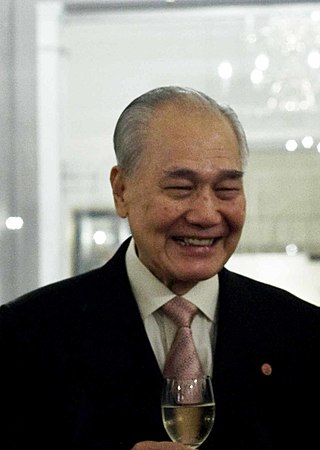
Anand Panyarachun is a Thai retired politician who was Prime Minister twice: once in 1991–1992 and again during the latter half of 1992. He was effective in initiating economic and political reforms, one of which was the drafting of Thailand's "People's Constitution", which was promulgated in 1997 and abrogated in 2006. Anand received a Ramon Magsaysay Award for Government Service in 1997.
Bernard Trink was a columnist for the Bangkok Post. A native New Yorker, Trink moved to Bangkok in the mid-1960s and taught English at various universities before taking over the "Nite Owl" column in 1966 at the now defunct Bangkok World, an English-language evening newspaper. Trink's popular "Nite Owl" column ran weekly for the next 37 years, covering Bangkok's seedier nighttime entertainment: go-go bars, nightclubs, pubs, and massage parlors. He also wrote restaurant reviews as Friar Tuck and did regular interviews, film and book reviews.

The Nation is an English-language daily online newspaper founded in 1971, published in Bangkok, Thailand. It is one of two English-language dailies in Bangkok, the other being the Bangkok Post. On 28 June 2019, it published its final broadsheet edition leaving only its online edition.
Thailand has a well-developed mass media sector, especially by Southeast Asian standards. The Thai government and the military have long exercised considerable control, especially over radio and TV stations. During the governments of Thaksin Shinawatra and the subsequent military-run administration after the 2006 coup and military coup of 2014, the media in Thailand—both domestic and foreign—have suffered from increasing restrictions and censorship, sometimes subtle, sometimes overt.
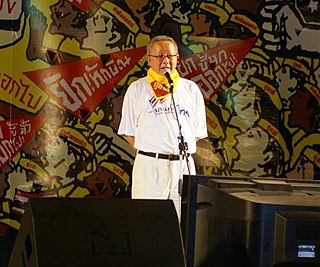
Sondhi Limthongkul is a Thai media mogul, conspiracy theorist, pro-Beijing anti-democracy reactionary activist, demagogue, and leader of the People's Alliance for Democracy (PAD). He was elected leader of the New Politics Party (NPP).

Thairath is a daily newspaper in Thai published in Bangkok and distributed nationwide. The paper is a broadsheet published with two sections. The first section is devoted to news. Although the news section is best known for its sensationalist coverage of crime and accidents, it also includes stories on Thai politics, economy, and society. The second section features coverage of sport and entertainment. Thairath is one of the oldest newspaper in Thai and the best-selling newspaper in Thailand, claiming a circulation in excess of 1 million copies daily.
Censorship in Thailand involves the strict control of political news under successive governments, including by harassment and manipulation.

The 2006 Thai coup d'état took place on 19 September 2006, when the Royal Thai Army staged a coup d'état against the elected caretaker government of Prime Minister Thaksin Shinawatra. The coup d'état, which was Thailand's first non-constitutional change of government in fifteen years since the 1991 Thai coup d'état, followed a year-long political crisis involving Thaksin, his allies, and political opponents and occurred less than a month before nationwide House elections were scheduled to be held. It has been widely reported in Thailand and elsewhere that General Prem Tinsulanonda, a key person in the military-monarchy nexus, Chairman of the Privy Council, was the mastermind of the coup. The military cancelled the scheduled 15 October elections, abrogated the 1997 constitution, dissolved parliament and the constitutional court, banned protests and all political activities, suppressed and censored the media, declared martial law nationwide, and arrested cabinet members.
The Council for National Security or CNS, formerly known as the Council for Democratic Reform or CDR, was the military junta that governed Thailand after staging a coup d'état against Prime Minister Thaksin Shinawatra.

Mom Rajawongse Pridiyathorn Devakula is a Thai economist. He was the Governor of the Bank of Thailand from 2001 to 2006. Following the 2006 Thai coup d'état he served as minister of finance and deputy prime minister in the interim civilian government led by Prime Minister Surayud Chulanont. Following the 2014 Thai coup d'état he was appointed as a deputy prime minister in the first military appointed cabinet under General Prayut Chan-o-cha. Two days earlier he had resigned from his position as chairman of the board of Post Publishing PLC, the publisher of the Bangkok Post, Thailand's leading English-language newspaper.

Surayud Chulanont is a Thai politician. He was the Prime Minister of Thailand and head of Thailand's interim government between 2006 and 2008. He is a former supreme commander of the Royal Thai Army and is currently Privy Councilor to King Vajiralongkorn.

Khun Ying Potjaman Damapong, formerly Potjaman Shinawatra, née Soypetpotjaman Damapong is the ex-wife of former Thai Prime Minister Thaksin Shinawatra.

The 2006 Bangkok bombings occurred on 31 December 2006 and 1 January 2007, during New Year's Eve festivities in Bangkok, Thailand. Four explosions went off almost simultaneously in different parts of the city at around 18:00 local time, followed by several more explosions within the next 90 minutes. Two explosions also occurred after midnight. In total, eight explosions were reported during the night.
People's Television (PTV) was a Thai satellite television station. It was established by former executives of the Thai Rak Thai party after the 2006 Thailand military coup overthrew the Thai Rak Thai-led government. It launched despite warnings from the Council for National Security, the military junta that seized power. PTV executives insisted that if ASTV could operate, then so could PTV.
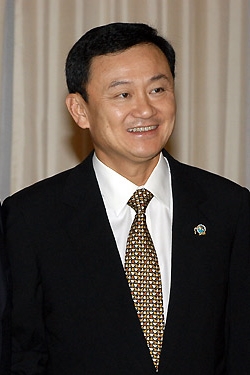
Thaksin Shinawatra was the 23rd prime minister of Thailand.
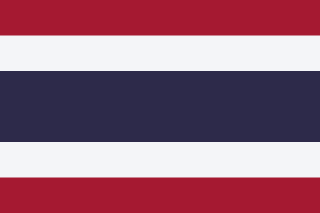
Corruption in Thailand is a national issue. Thai law provides criminal penalties for conviction of official corruption. Thailand's 2014 military junta, the National Council for Peace and Order (NCPO), stated that fighting corruption would be one of its main focus points, a common practice for military dictatorships following Thailand's frequent military coups. Despite the promises, officials engaged in corrupt practices with impunity, and the NCPO engaged in corrupt practices itself.

On 17 August 2015, a bombing took place inside the Erawan Shrine at the Ratchaprasong intersection in Pathum Wan District, Bangkok, Thailand, killing 20 people and injuring 125. Thai police were reported to have arrested two suspects, the second of whom confessed to having been the bomber. He later retracted his confession.
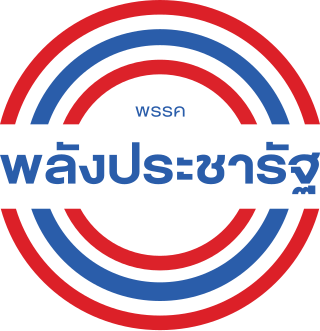
Palang Pracharath Party is a Thai civil-military political party with ties to the National Council for Peace and Order, the military junta that ruled the country after the 2014 coup. It was established in 2018 by Chuan Chuchan and Suchart Jantarachotikul as a "party of power" to support Prayut Chan-o-cha in 2019 Thai general election.
















